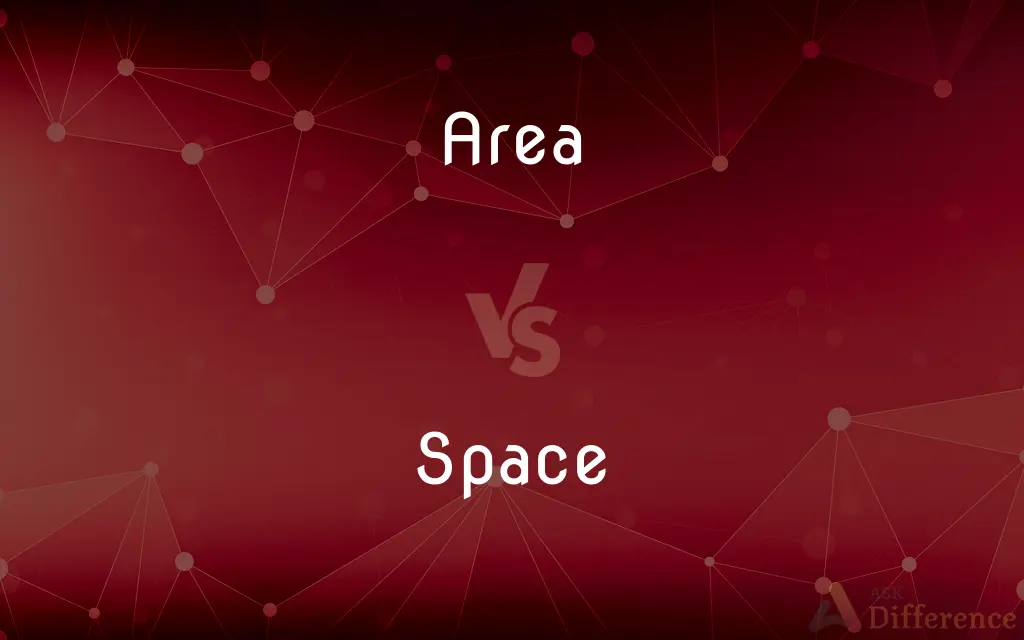Area vs. Space — What's the Difference?
By Tayyaba Rehman & Maham Liaqat — Updated on March 26, 2024
Area refers to a specific extent of surface within boundaries, often measured in square units, while space encompasses a boundless three-dimensional extent where objects exist and events occur.

Difference Between Area and Space
Table of Contents
ADVERTISEMENT
Key Differences
Area is a mathematical concept defining the extent of a two-dimensional surface, usually measured in square units (such as square meters or square miles). It is often used to describe the size of land, rooms, or buildings within defined boundaries. On the other hand, space refers to the infinite three-dimensional extent in which objects and events have relative position and direction. Unlike area, space is not limited to two dimensions and does not require physical boundaries for its definition.
While area is a quantifiable measure used in planning, construction, and geography to determine the size of a specific surface, space can refer to physical emptiness, a specific area with a more abstract or functional meaning (like living space), or the vast expanses of the universe. Whereas the calculation of an area is constrained to defined shapes and dimensions, space can be conceptual and does not lend itself to simple quantification.
Area is often discussed in terms of its practical applications, such as determining the amount of material needed for flooring or the capacity of a plot of land to accommodate buildings. Space, however, is a broader concept that encompasses areas both small (like the space in a drawer) and astronomically large (like outer space), serving various purposes across different fields, from physics to architecture and beyond.
In real estate and architecture, the term "area" is precisely used to refer to the size of parcels of land or sections of buildings, critical for design and legal purposes. "Space," however, might be used more subjectively to describe the feel or functional utility of an area, such as how roomy or airy a living space feels, irrespective of its actual area.
Both concepts are crucial for understanding and organizing the physical world, but they serve different purposes. Area provides a concrete measure of surfaces, useful in numerous practical and scientific applications, while space offers a more versatile framework for understanding physical and abstract environments, allowing for the discussion of dimensions, capacity, and the universe at large.
ADVERTISEMENT
Comparison Chart
Dimensions
Two-dimensional (length × width)
Three-dimensional
Measurement
Square units (sq. meters, sq. miles, etc.)
Can be volumetric or abstract
Boundaries
Defined by clear limits
Can be limitless or defined by context
Applications
Land measurement, room sizes, maps
Architecture, physics, storage, outer space
Concept
Quantitative and geometric
Both quantitative (in physics) and qualitative
Compare with Definitions
Area
The amount of space inside the boundary of a flat object.
The area of a triangle can be calculated using its base and height.
Space
The infinite extension in which everything exists.
The study of space is fundamental to astronomy.
Area
The extent of a surface.
The area of the park is 500 square meters.
Space
A specific area available for a particular purpose.
There's enough space in the attic for old furniture.
Area
A specific region or section.
They live in a rural area.
Space
The physical gap between objects.
The space between the couch and the wall is too narrow.
Area
Scope or field of study.
Her area of expertise is marine biology.
Space
The freedom to live, think, and develop in a way that suits one.
She needed space to focus on her artwork.
Area
A part of a place, city, or country.
The restaurant is located in the downtown area.
Space
The expanse beyond the Earth's atmosphere.
Astronauts conduct experiments in space.
Area
Area is the quantity that expresses the extent of a two-dimensional region, shape, or planar lamina, in the plane. Surface area is its analog on the two-dimensional surface of a three-dimensional object.
Space
Space is the boundless three-dimensional extent in which objects and events have relative position and direction. In classical physics, physical space is often conceived in three linear dimensions, although modern physicists usually consider it, with time, to be part of a boundless four-dimensional continuum known as spacetime.
Area
A roughly bounded part of the space on a surface; a region:a farming area; the New York area.
Space
(Mathematics) A set of elements or points satisfying specified geometric postulates
Non-Euclidean space.
Area
A surface, especially an open, unoccupied piece of ground:a landing area; a playing area.
Space
The infinite extension of the three-dimensional region in which all matter exists.
Area
A distinct part or section, as of a building, set aside for a specific function:a storage area in the basement.
Space
The expanse in which the solar system, stars, and galaxies exist; the universe.
Area
A division of experience, activity, or knowledge; a field:studies in the area of finance; a job in the health-care area.
Space
The region of this expanse beyond Earth's atmosphere.
Area
An open, sunken space next to a building; an areaway.
Space
An extent or expanse of a surface or three-dimensional area
Water covered a large space at the end of the valley.
Area
Abbr. AThe extent of a planar region or of the surface of a solid measured in square units.
Space
A blank or empty area
The spaces between words.
Area
(mathematics) A measure of the extent of a surface; it is measured in square units.
Space
An area provided for a particular purpose
A parking space.
Area
A particular geographic region.
Space
Reserved or available accommodation on a public transportation vehicle.
Area
Any particular extent of surface, especially an empty or unused extent.
The photo is a little dark in that area.
Space
A period or interval of time
Within the space of a week.
Area
The extent, scope, or range of an object or concept.
The plans are a bit vague in that area.
Space
A little while
Let's rest for a space.
Area
(British) An open space, below ground level, giving access to the basement of a house, and typically separated from the pavement by railings.
Space
Sufficient freedom from external pressure to develop or explore one's needs, interests, and individuality
"The need for personal space inevitably asserts itself" (Maggie Scarf).
Area
(soccer) Penalty box; penalty area.
Space
(Music) One of the intervals between the lines of a staff.
Area
(slang) Genitals.
Space
(Printing) One of the blank pieces of type or other means used for separating words or characters.
Area
Any plane surface, as of the floor of a room or church, or of the ground within an inclosure; an open space in a building.
The Alban lake . . . looks like the area of some vast amphitheater.
Space
One of the intervals during the telegraphic transmission of a message when the key is open or not in contact.
Area
The inclosed space on which a building stands.
Space
Blank sections in printed material or broadcast time available for use by advertisers.
Area
The sunken space or court, giving ingress and affording light to the basement of a building.
Space
To organize or arrange with spaces between
Carefully space the words on the poster.
Area
An extent of surface; a tract of the earth's surface; a region; as, vast uncultivated areas.
Space
To separate or keep apart
The buildings are spaced far from each other.
Area
The superficial contents of any figure; the surface included within any given lines; superficial extent; as, the area of a square or a triangle.
Space
(Slang) To stupefy or disorient. Often used with out
The antihistamine spaces me out so I can't think clearly.
Area
A spot or small marked space; as, the germinative area.
Space
To be or become stupefied or disoriented. Often used with out
I was supposed to meet her, but I spaced out and forgot.
Area
Extent; scope; range; as, a wide area of thought.
The largest area of human history and man's common nature.
Space
(heading) Of time.
Area
A particular geographical region of indefinite boundary (usually serving some special purpose or distinguished by its people or culture or geography);
It was a mountainous area
Bible country
Space
Free time; leisure, opportunity.
Area
A particular environment or walk of life;
His social sphere is limited
It was a closed area of employment
He's out of my orbit
Space
A specific (specified) period of time.
Area
A subject of study;
It was his area of specialization
Areas of interest include...
Space
An undefined period of time (without qualifier, especially a short period); a while.
Area
A part of a structure having some specific characteristic or function;
The spacious cooking area provided plenty of room for servants
Space
(heading) Unlimited or generalized extent, physical or otherwise.
Area
A part of an animal that has a special function or is supplied by a given artery or nerve;
In the abdominal region
Space
Distance between things.
Area
The extent of a 2-dimensional surface enclosed within a boundary;
The area of a rectangle
It was about 500 square feet in area
Space
Physical extent across two or three dimensions (sometimes for or to do something).
Space
Physical extent in all directions, seen as an attribute of the universe (now usually considered as a part of space-time), or a mathematical model of this.
Space
The near-vacuum in which planets, stars and other celestial objects are situated; the universe beyond the earth's atmosphere.
The first man in space
Space
The physical and psychological area one needs within which to live or operate; personal freedom.
Space
(heading) A bounded or specific extent, physical or otherwise.
Space
A (chiefly empty) area or volume with set limits or boundaries.
Space
(music) A position on the staff or stave bounded by lines.
Space
A gap in text between words, lines etc., or a digital character used to create such a gap.
Space
(metal type) A piece of metal type used to separate words, cast lower than other type so as not to take ink, especially one that is narrower than one en (compare quad).
Space
A gap; an empty place.
Space
(geometry) A set of points, each of which is uniquely specified by a number (the dimensionality) of coordinates.
Space
A generalized construct or set whose members have some property in common; typically there will be a geometric metaphor allowing these members to be viewed as "points". Often used with a restricting modifier describing the members (e.g. vector space), or indicating the inventor of the construct (e.g. Hilbert space).
Functional analysis is best approached through a sound knowledge of Hilbert space theory.
Space
A field, area, or sphere of activity or endeavour.
Innovation in the browser space
Space
Anything analogous to a physical space in which one can interact, such as an online chat room.
Space
To roam, walk, wander.
Space
(transitive) To set some distance apart.
Faye had spaced the pots at 8-inch intervals on the windowsill.
The cities are evenly spaced.
Space
To insert or utilise spaces in a written text.
This paragraph seems badly spaced.
Space
To eject into outer space, usually without a space suit.
The captain spaced the traitors.
Space
To travel into and through outer space.
Space
Extension, considered independently of anything which it may contain; that which makes extended objects conceivable and possible.
Pure space is capable neither of resistance nor motion.
Space
Place, having more or less extension; room.
They gave him chase, and hunted him as hare;Long had he no space to dwell [in].
While I have time and space.
Space
A quantity or portion of extension; distance from one thing to another; an interval between any two or more objects; as, the space between two stars or two hills; the sound was heard for the space of a mile.
Put a space betwixt drove and drove.
Space
Quantity of time; an interval between two points of time; duration; time.
Nine times the space that measures day and night.
God may defer his judgments for a time, and give a people a longer space of repentance.
Space
A short time; a while.
Space
Walk; track; path; course.
This ilke [same] monk let old things pace,And held after the new world the space.
Space
A small piece of metal cast lower than a face type, so as not to receive the ink in printing, - used to separate words or letters.
Space
One of the intervals, or open places, between the lines of the staff.
Space
That portion of the universe outside the earth or its atmosphere; - called also outer space.
Space
To walk; to rove; to roam.
And loved in forests wild to space.
Space
To arrange or adjust the spaces in or between; as, to space words, lines, or letters.
Space
The unlimited expanse in which everything is located;
They tested his ability to locate objects in space
Space
An empty area (usually bounded in some way between things);
The architect left space in front of the building
They stopped at an open space in the jungle
The space between his teeth
Space
An area reserved for some particular purpose;
The laboratory's floor space
Space
A blank character used to separate successive words in writing or printing;
He said the space is the most important character in the alphabet
Space
The interval between two times;
The distance from birth to death
It all happened in the space of 10 minutes
Space
A blank area;
Write your name in the space provided
Space
One of the areas between or below or above the lines of a musical staff;
The spaces are the notes F-A-C-E
Space
(printing) a block of type without a raised letter; used for spacing between words
Space
Place at intervals;
Space the interviews so that you have some time between the different candidates
Common Curiosities
What is area?
Area is the measure of the extent of a two-dimensional surface, expressed in square units.
Can the concept of space include area?
Yes, space can encompass areas as parts of its broader definition, especially when referring to specific or functional extents.
How does space relate to architecture?
In architecture, space is considered for its functional and aesthetic qualities, focusing on how areas are designed to create comfortable or useful environments.
How is area used in geography?
In geography, area helps in mapping and categorizing different parts of the Earth's surface based on size and features.
How do area and space differ in measurement?
Area is measured in two dimensions using square units, while space can be considered in three dimensions and measured volumetrically or be abstract.
Is outer space considered when talking about space in general?
Yes, outer space is a key aspect of the broader concept of space, representing the vast expanses beyond Earth's atmosphere.
What is space?
Space refers to the three-dimensional continuum that extends infinitely in all directions and contains all matter and energy.
Why is the area important in real estate?
In real estate, area determines the size of land or property, which is crucial for valuation, planning, and utility.
What distinguishes personal space from physical space?
Personal space refers to the psychological comfort zone around individuals, while physical space refers to actual three-dimensional areas.
What does living space refer to?
Living space refers to the area or room available for individuals to inhabit, emphasizing comfort, design, and functionality.
What role does space play in physics?
In physics, space is fundamental to understanding the universe's structure, the behavior of objects within it, and concepts like time and gravity.
Why is the concept of space important in design?
Space is crucial in design for ensuring functionality, aesthetics, and comfort, influencing how environments are experienced.
Can area and space be used interchangeably?
While they have overlapping contexts, their usage depends on the dimensionality and specificity of what is being referred to; thus, they are not always interchangeable.
How do you calculate the area of a shape?
The area of a shape is calculated based on its geometry, using formulas that incorporate dimensions like length and width for simple shapes, or more complex integrations for irregular ones.
How does the concept of space impact our understanding of the universe?
The concept of space expands our understanding of the universe, encompassing the study of celestial bodies, distances, and the fundamental nature of existence beyond Earth.
Share Your Discovery

Previous Comparison
Fisher vs. Marten
Next Comparison
Float vs. DoubleAuthor Spotlight
Written by
Tayyaba RehmanTayyaba Rehman is a distinguished writer, currently serving as a primary contributor to askdifference.com. As a researcher in semantics and etymology, Tayyaba's passion for the complexity of languages and their distinctions has found a perfect home on the platform. Tayyaba delves into the intricacies of language, distinguishing between commonly confused words and phrases, thereby providing clarity for readers worldwide.
Co-written by
Maham Liaqat















































